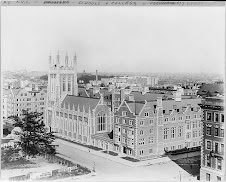It has been said that a society can be judged by how it treats its people that are assumed to have the least in life. During this Poverty Initiative Immersion Course I have once again been reminded of a forgotten root in the degradation of our society; how we treat one another. Growing up at about 8 years old I remember feeling a twinge of shame when I found out that my Auntie’s job was as a domestic worker for the “Judge” in my hometown. And when I found out in my early teens that my great-grandmother had been a domestic worker for one of the most powerful men in the transportation world, it was a final step in the realization of how pervasive domestic work was in my family’s history.
By the way that shame didn’t last for long because when Auntie came home, she came home from work like anybody else. She was good at what she did and was a sought after employee in town, so the Judge did whatever it took to keep her in his employ. Auntie owned the home she lived in and shared so freely with all of our family. Auntie always had food in the cupboard and refrigerator. Auntie always gave one tenth of her earnings to the church. Auntie always had dignity enough to love me like I was a child of God’s promise.
My great-grandmother had retired by the time we visited her in New York City. She had followed her employer to New York City. She was so valued that she had an apartment in New York, a home and property in Jacksonville, Florida. She was considered a member of the family with much to contribute not only to the household affairs but the upbringing of socially active rich children. I remember her telling me the story of how those adult 30 something children cried for scores of minutes in the train station as she made her way back to Jacksonville. At least in New York they visited her up in Harlem every week.
These two women in my life taught me at an early age that a job well done is a respectable job. They taught me how to walk out the front door to work with dignity and back into the home with that dignity still intact. I have cleaned the toilet bowls of a bed and breakfast. As an actor I have done living history tours of the African American input to the history of a tourist Victorian seaside resort. I have seen how many children have acquired a college education on the work of household management.
So how does that relate to Poverty in the US in 2009? Well, let’s put it in perspective. My Auntie and great-grandmother were given a fair wage. They had contracted hours that were respected by their employers. They had incredible health care. They had paid vacation. They were considered valued and vital to smooth operations of the households in which they worked. For both of them, I remember how they asserted that their families came first. And they always, always had Sunday off to go to church.
So why is it that in the year 2009 Domestic Workers United has to fight for these basic rights? What happened in our society that experience of my Aunt and great-grandmother became the freakish exception rather than the norm? Is it because although Black, they were born in this country? Has prejudice made it alright to mistreat people who serve in positions of domesticity today? Is it outright racism? Is it the devaluation of a person because they work for people rather than this corporate entity most people think they work for? A corporate entity in which a few gross the top dollars? So who exactly do those who hire service and domestic workers actually think they are working for?!
I have been moved by the struggles we have linked with during this immersion. But my heart aches because at the root of so much of what we have seen is the disrespect of the value another human being’s life. From the lack of clean air spaces in the Bronx to remembering the attack on the homeless village in Thomkins Square Park in 1988—why is it still okay to sacrifice so many for the well being of a few? Yes, it’s time to stop all this talk about lowering poverty, thereby putting value on who deserves to eat, drink water, have basic rights for proper working conditions. The only paradigm that will work is a new one. The social movement must be to end poverty, period. Each immersion, rather each day I walk out into the world I see this more clearly.






